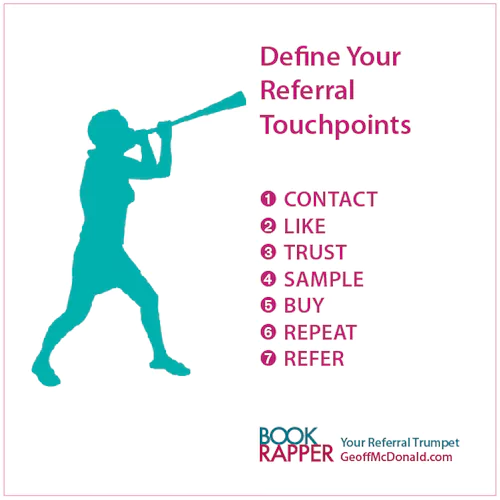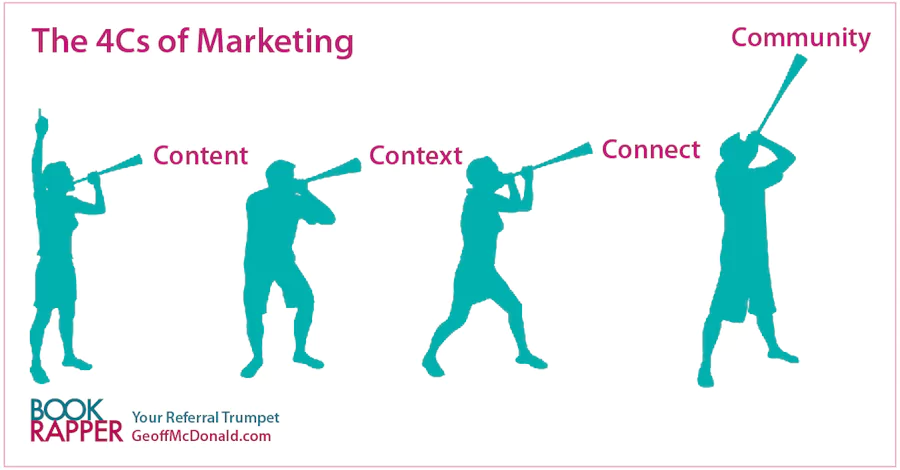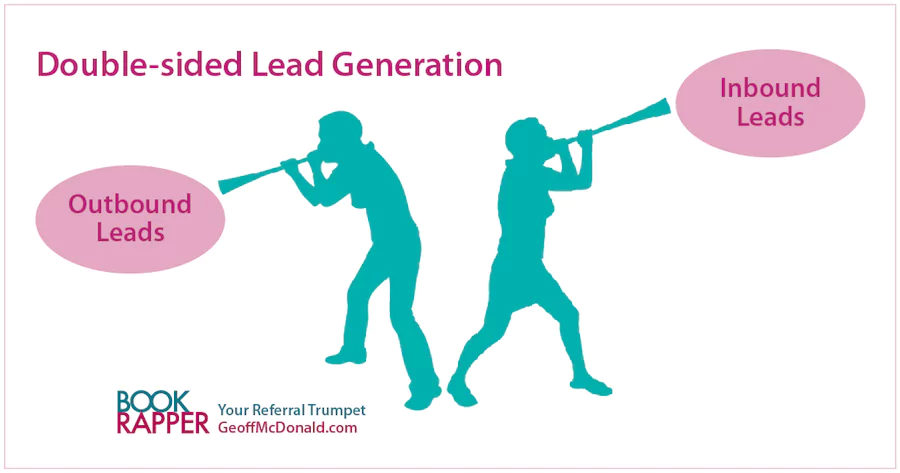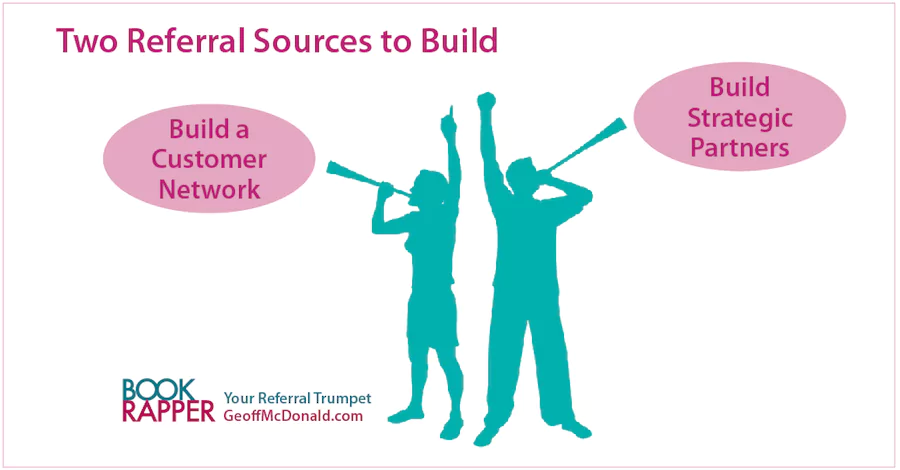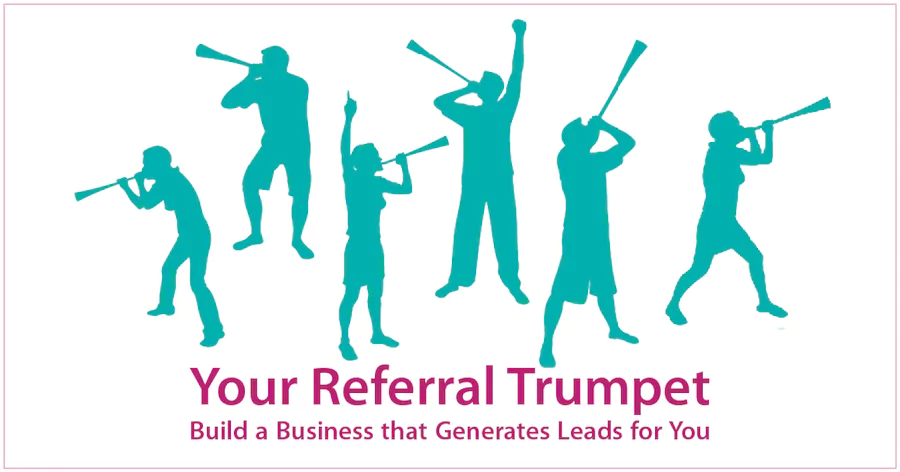
How to build a business that Generates Leads and Referrals for You
How to build a business that generates leads and referrals for you is based on the Book Rapper summary of John Jantsch’s book The Referral Engine. [Updated and Edited 10 May 2022].
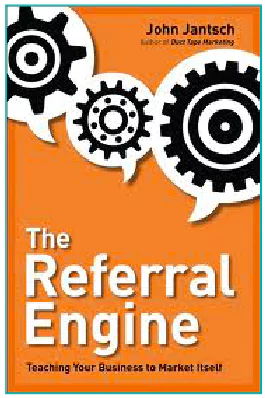 The Big Idea
The Big Idea
Too often referrals are a BTW – “By the way, got any referrals for me?” Yuck!!! Instead of tackily tacking it on the end of your service, start with the referral in mind. Build the expectation in your customer’s mind in advance. And, the business systems that deliver remarkable results.
Speed RAP
A flood of referrals will only arrive if you build a referral culture and the business systems to match. You’ll need to differentiate yourself, identify your ideal customer, design referral touchpoints, educate with content and attract both customers and partners.
Your Challenge
Invite, teach and encourage others to blow your trumpet! How many new referrals can you generate in the next 90 days? Start by counting them. Then build systems to attract more and better-qualified leads.
Most people fail at getting #referrals because they do them backwards.
Book Review: The Referral Engine
John Jantsch, The Referral Engine: Teaching Your Business to Market Itself; Portfolio, Penguin Books; New York, 2010.
A hands-on guide to having your customers generate new business leads on your behalf.
- Examples galore: pluck the ones that work best for your situation.
- Practical: apply this in the next hour…
- Low or no-cost solutions.
- Systematic: apply it to build a better business.
- Comprehensive and open-ended: deepen the value you gain from this book over time.
- Simple and effective: Content Marketing strategies by someone who does it very well.
It’s for anyone wanting more business leads – aimed at small businesses, suitable for all businesses.
 John Jantsch
John Jantsch
John Jantsch is a small business marketing expert. His central belief is that marketing is best approached as a system. Author of the best selling book and coaching network Duct Tape Marketing. Writes a popular blog, presents ‘must listen’ podcasts and is a sought after conference speaker and webinar presenter. John also has a strong social media influence.
- Book Website: ReferralEngineBook.com
- Author Website: JohnJantsch.com
- John Jantsch on Twitter: @ducttape
This book is a big dipper. Have it on your shelf so you can dip into it on a regular basis. Value guarranteeed!
Seven Steps to Building a Referrals Mindset
What makes you blow someone else’s trumpet? What makes you refer someone or not? Where do you get most of your business from? If it’s referrals, do you have a method for making this happen or is it ad-hoc? It’s time to consider referrals as a lead generation system. And, here are seven principles to build it upon…
 1 It’s in your brain…
1 It’s in your brain…
We’re physiologically wired to make referrals. For most of us, the part of the brain called the hypothalamus gets a little buzz every time we do good for others.
2 Build Social Capital
Helping other people is the basis of living together as a community. Referrals started out as a survival mechanism. Now they help us build relationships and they’re a form of social currency.
3 Manage The Risk
Our reputation is on the line when we toot another person or business. The size of the risk depends on the situation. It’s at least as great as the risk we take when we make a purchase.
4 Be Remarkable
It’s much easier to refer a remarkable business than a boring one because it’s more likely we’ll naturally talk about it. ‘Hey, did you hear about the…’
5 Develop Consistency
Securing referrals is a long term game. That’s because it takes consistency to build trust. And referrals are based on being able to repeat the result.
6 Trust Matters
The most important reason someone does or doesn’t make a referral is the level of trust. The higher the price and the more important the need, the more that trust matters.
7 Implement Systems
Marketing is a set of systems and processes. And, to avoid personally asking for a referral, you can design the situation to ask for you. For example, offer a 2 for 1 coupon that let’s a customer share your service with a friend.
Eight Steps to Build Your Referral Culture
Having a referral system may mean you’ll never have to make cold calls again. And, the even bigger opportunity is to build a great business. To do this design a referral culture that includes systems, processes and your team working towards the same goal. Here are eight things to consider…
1 Habits
Build the idea of generating leads and referrals into your daily actions. For instance, create a scoreboard for how many you’ve created today.
2 Tools
Create the referral tools you need and train your team in their use. This can range from having a website and electronic brochure to the authority to directly solve customers’ problems.
3 Remarkable
Devote time to making your products and customer interactions worth talking about. This will grease the wheel for generating referrals.
4 Service
Shift the culture from ‘get’ to ‘give’. Promote and reward service and help others. Even if it means the loss of an immediate sale by recommending someone else better suited to resolving your customer’s situation.
5 Conviction
Set up the expectation of referrals. Drop this into your sales presentations: ‘We expect that you’ll be so thrilled with our result, then you’ll naturally want to recommend us to your colleagues.’ To do this you’ll need to instil a belief in what you do and the value you provide.
6 Premium
Surveys suggest that businesses that rely on referrals are more likely to be at the premium end of the price spectrum. It’s part of the social proof that you must be good!
7 Education
Outbound leads generated by advertising rely on interrupting people and selling to them. Instead, build an inbound marketing channel that attracts customers to you. Educate rather than sell.
8 Specific
To make referrals happen you need a trustworthy person to provide a solution to a specific need or challenge. Be really clear about what customer needs you to address. If required, talk it over with customers, a coach or a mentor.
The Two Critical Elements of Securing Referrals
There are two critical elements of securing referrals: Be really clear on what you do – and know how to communicate this in terms your customer will understand. And, get really clear on what your Ideal Customer looks like. A referral for the wrong customer can be worse than no referral at all.
 1 Clarify Your Core Difference
1 Clarify Your Core Difference
Your Core Difference needs to be unique, worth talking about and concrete. And most importantly, for someone to blow your trumpet effectively, they need to be able to speak what you do clearly, accurately and simply.
Scott Ginsberg is the name-tag guy. He does it because it helps break down barriers when meeting people. He wears one everywhere he goes. Everywhere! He even carries spares in case an overzealous person rips it off. And, if that fails he has it tattooed on his chest!
If you don’t have a clear core difference, you might need to create it by tweaking, stretching or revamping what you do and how you do it. Or you simply may need to look more deeply at what you’re already doing.
Questions
- What can you highlight that you’re already doing?
- Who can you ask to point it out?
- What’s remarkable about your business?
- What do customers say about you?
- What’s the one thing you are known for?
- What’s a metaphor for what you do
2 Define Your Ideal Customer
Defining your ideal customer is important for two reasons:
- You know who you’re working to attract. And therefore you can then find out where they hang out.
- To educate the people referring others to you. This is to avoid recommendations that only waste everybody’s time and reputation.
If you want to be remarkable and talked about, you’ll need to take a stand. To achieve this sharpen your business focus: Add or reduce product features, provide service in a unique way and set interesting prices. Not everyone is going to like this – and that’s the good news. It makes you more unique. And it gives you an opportunity to blow other people’s trumpets too: ‘No, we don’t do that. However, I can recommend…’
Questions
- Who do you want to help? And, what do you want to achieve?
- Who do you love working with?
- Which customers do you wish you had more of?
- What qualities of these customers do you like most?
- Who DON’T you want as customers?
- What are the personalities of your Ideal Customer?
How to Define Your Referral Touchpoints
If you’re going to start with the referral in mind and the lifetime value of the customer, then every single point of contact and influence with them needs to be considered. Here are seven steps to include as you build your business and referral systems.
1 Refer
Your goal is not an occasional referral, it’s to generate a consistent flow. The ideal situation would be for every single customer to be an advocate for your business. To achieve this you’ll need to continuously monitor, measure and adjust your referral system.
2 Repeat
The key to securing repeat business is to produce measurable and desirable results from the first purchase. You can increase the chances of this by creating and sharing how-to guides with video or in-store demonstrations.
3 Buy
In the referral mindset, the first sale is significant and it’s merely one piece of the customer experience. Create a process to reveal their true expectations and then deliver. Hint: Start by asking questions. What do they really want?
4 Sample
The best way a potential customer can find out if you’re the right solution for them is to test run your business. Provide an entry-level offer, seminar or small sample to continue the smooth referral pathway.
5 Trust
All customers need to trust us before they buy. This may be quick or take some time. To manage trust provide a range of educational materials to inform your customer about what you do and how you do it.
6 Like
What’s behind the facade? After the initial meeting, what will your potential customer see, hear and feel about your business? Invite a respected colleague to review your office, store or website.
7 Contact
Make a good first impression at the first point of contact between your referral and your business. The more narrow you define your ideal customer, the more directly you can speak to their needs.
The Four Ps of Marketing are now the Four Cs of Marketing
Most traditional businesses rely on face-to-face contact to attract customers and provide service. Today, technology-focused businesses do most of the marketing and service delivery online. Both are useful. And, together they’re potent.
Traditionally marketing relied on the Four Ps :
- Product
- Place
- Price and
- Promotion
Today marketers are talking about the Four* Cs :
- Content
- Context
- Connection and
- Community
*Compare this with Joseph Jaffe’s 7Cs as discussed in Book Rapper issue Talk With Me.
Typically, online businesses are good at creating content and context and traditional businesses are better at building connections and community. To generate an army of people trumpeting your business be great at both.
Forget the #4Ps of #marketing, Now it’s the 4Cs
1 Connection
As we become more engaged in our technology, the need for the human touch increases too. And, we’re seeking empathy, support and motivation from unlikely sources – including brands and online sites. If you can create a cult following around your business, referrals will naturally follow.
2 Context
Making sense of what’s going on is the role of a leader and expert. Filter out the noise, link related ideas and provide clarity in the minds of your customers. Shifting context is a potent tool for creating opportunities and new ways of looking at things.
3 Content
Content is the new currency for marketing and lead generation. We no longer trust advertising, we don’t want to be sold to and digital technology lets us create it with relative ease. Write white papers, a blog, post videos, record podcasts and find ways to express your ideas, expertise and the value you provide. Do it online and present in person.
4 Community
Previously, we congregated in local groups based on where we live. Today, through the internet we are forming new communities based on common interests, shared ideas and the pursuit of common goals. The opportunity for assembling an army online and deepening relationships offline can be a potent driver for your business.
Three Crucial Content Marketing Goals
Content is the new fuel for lead generation. Use it to educate your prospects to sample your wares; for your customers to learn how to grab the most value from your product/service and to instruct your advocates on how best to refer you. And, it’ll get you past the gatekeepers. Here are some important elements to consider as you develop your Content Marketing strategy…
Inbound Leads
Replace outbound with inbound lead generation tactics where your customers find you. Building your online footprint has become your new marketing goal. The key is to generate buzz as you demonstrate your expertise.
Three Content Marketing Goals
- Be talked about and have others toot good things about you.
- Share your secret way of doing things.
- Develop tools and material to highlight your point of difference.
Content Actions
- Generate PR
- Use Social Media
- Write White Papers
- Gather Testimonials
- Teach in a presentation
- Educate via a workshop
- Blog news, tips and how-tos
- Interview other experts for a podcast
Outbound Leads
Traditional outbound lead generation tactics such as directory advertising, trade show attendance and print ads are losing their impact. They’ve become more expensive and less effective.
Blend and Recycle
The great bonus of creating content is that you can slice and dice it into new configurations. For instance, once you write your White Paper you can tweet it’s key points, turn it into several blog posts, record it as a podcast, demonstrate it as a video and present it at your workshop.
Create Trigger Phrases
What are the words your customers say when they need what you sell? For instance, “I wish I had…” This is critical for your advocates to listen for opportunities to refer you.
The Two Primary Sources of Referrals
The obvious place to source referrals is through your existing customers. A less obvious and potentially more lucrative opportunity is to form a network of business owners who cater to the same Ideal Customer. Tap into both for best results.
Customer Network Referrals
The key to building a referral network through your customers is to design a systematic approach into your overall sales process and customer service.
Most people ask for a referral after the product or service has been delivered. Yet, the best time to ask is before you even start! In this way referrals become a condition of doing business and you set the expectation for what’s about to come. Then, you just need to exceed expectations. And, you can do that by simply tossing in something extra to what was expected – like 7 items in a box of 6.
Questions
- How will you gauge the level of referral participation present in your customer base?
- What process will you create to ensure a referral is a condition of doing business?
- How will you consistently exceed expectations in delivering your product/service?
- How will you reward your referral champions?
- What events can you create to build your own customer referral network?
- What tools and processes will you provide for others so they can effectively trumpet your services?
- And the most important question of all: How will you measure the value you create for your customers?
Strategic Partner Referrals
Who else serves your Ideal Customer? And, I don’t mean your direct competitors. Create your own network of business owners to form referral making partnerships.
The first and most crucial step is to find strategic partners that you would be happy to refer. This is vital. Ask “Would I feel 100% comfortable to refer my best customer to this potential partner?” Choose wisely.
Questions
- How will you source and test strategic partners?
- How will you share the value of your strategic partners to your customers?
- What can you do to ensure your network partners actively share referrals?
- How will you cobrand your content to share through their network?
- What joint events will you create?
- How will you formally promote your strategic partners?
- How will you teach your strategic partners to generate more referrals?
More on how to Generate Referrals
Here are a couple more related Book Rapper issues to rap your head around…
Talk With Me
Learn the art of conversation and the 7Cs of Marketing. An alternative view to the 4Cs on Page 7. Plus more on building community.
The Book Rapper summary derived from Joseph Jaffe’s Join The Conversation.
Web Line
Trust is crucial in building referrals. Learn how to build trust through content generation and community building in the online world.
The Book Rapper summary derived from Chris Brogan and Julien Smith’s Trust Agents.
We Blog
Learn the basis of blog writing and generating great content. Plus, how acceleration makes your blog like a movie.
Derived from: Michael A Banks; Blogging Heroes
Frog Power
The key to a breakthrough in your performance lies in changing the context you’re operating from.
Derived from: Steve Zaffron and Dave Logan’s The Three Laws of Performance.
Brand Worship
Reveal the art of Community Marketing and the power of connecting with your customers. Cult brands are built on referrals!
Derived from Douglas Atkin’s The Culting of Brands.
Action Plan
Grab John Jantsch’s Discussion Guide for a useful summary and comprehensive set of actions for you to take advantage of.
Buy the Book
Now that you’ve had a taste, eat the meal! And build a business that generates an endless flood of referrals.

 John Jantsch
John Jantsch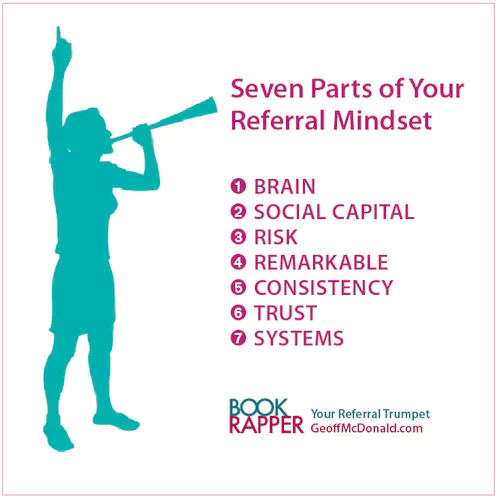 1 It’s in your brain…
1 It’s in your brain…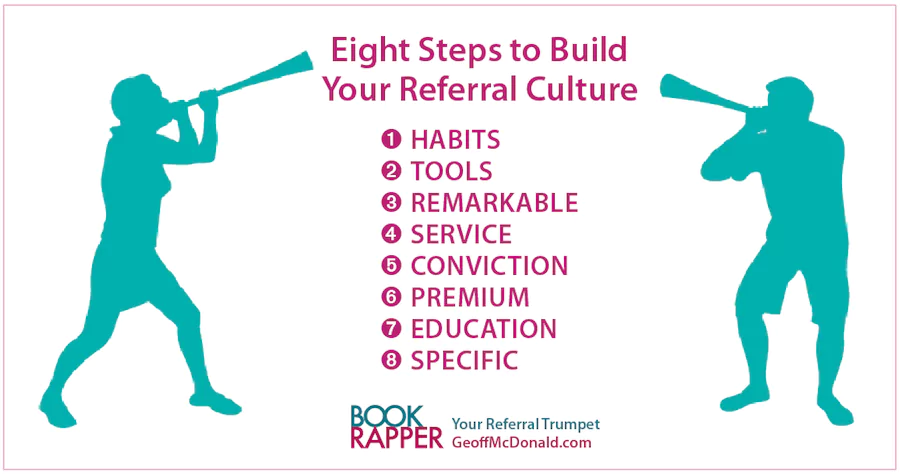
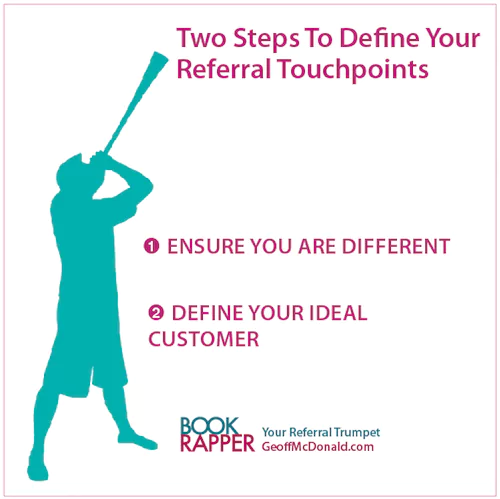 1 Clarify Your Core Difference
1 Clarify Your Core Difference